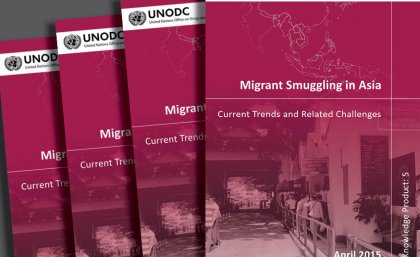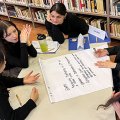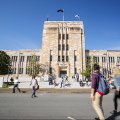
The University of Queensland has collaborated with the United Nations to produce a world-first comprehensive report on migrant smuggling in Asia.
The Migrant Smuggling in Asia: Current Trends and Related Challenges report is a detailed analysis of the smugglers, migrants, routes, dangers and finances involved in smuggling into, out of and across 28 countries in Asia.
It has been produced by UQ’s Migrant Smuggling Working Group and the UN Office on Drugs and Crime (UNODC).
Criminal law Professor and UQ Migrant Smuggling Working Group Co-ordinator Dr Andreas Schloenhardt said migrant smuggling, while it was high profile, remained poorly documented and researched.
“Many myths and common perceptions about the smuggling of migrants, and about the effect of policy and law enforcement measures to stop it, are not supported by any evidence,” Professor Schloenhardt said.
“Far from being vast organisations headed by a ‘Mr Big’, the research shows that smuggling often involves small-scale, ad hoc operations that are part of loosely connected networks rather than Mafia-style cartels.
“This means they can be flexible – changing routes and arrangements as needed.
“Most migrant smugglers were once themselves smuggled migrants who use their experience and knowledge to smuggle other migrants from their home country, often including their family and friends."
The report draws on a range of sources, including questionnaires from authorities in several countries, providing an overview of migrant smuggling in Asia, and also the smuggling of migrants from Asia to Western Europe, North America, East and Southeast Asia, and Australia.
“This reports provides a strong base for policy development and future research,” Professor Schloenhardt said.
Key findings include:
- Smuggling fees as high as $US50,000 mean migrants often incur substantial debt in the attempt to secure a better life.
- Smuggled migrants who are isolated and living illegally cannot assert their rights and are vulnerable to abuse and exploitation.
- Most migrant smuggling occurs within Asia, but smuggled migrants are also reaching Australia, New Zealand, Europe and North America.
Professor Schloenhardt has been invited to present his research findings at an international conference at the United Nations Headquarters in New York later this month.
He said the UQ Migrant Smuggling Working Group had a long-standing relationship with the UN.
The report was commissioned by UN Office on Drugs and Crime Southeast Asia and the Pacific office, which works with governments and other organisations to promote criminal justice and combat organised crime across borders.
Media: UQ law Professor Andreas Schloenhardt, (07) 3365 6191, a.schloenhardt@law.uq.edu.au, or Publications Officer Nadine Davidson-Wall (07) 3346 9263, n.davidson-wall@law.uq.edu.au. For comment on the Four Corner's episode last night, please contact Professor Schloenhardt by email.
.jpg)










